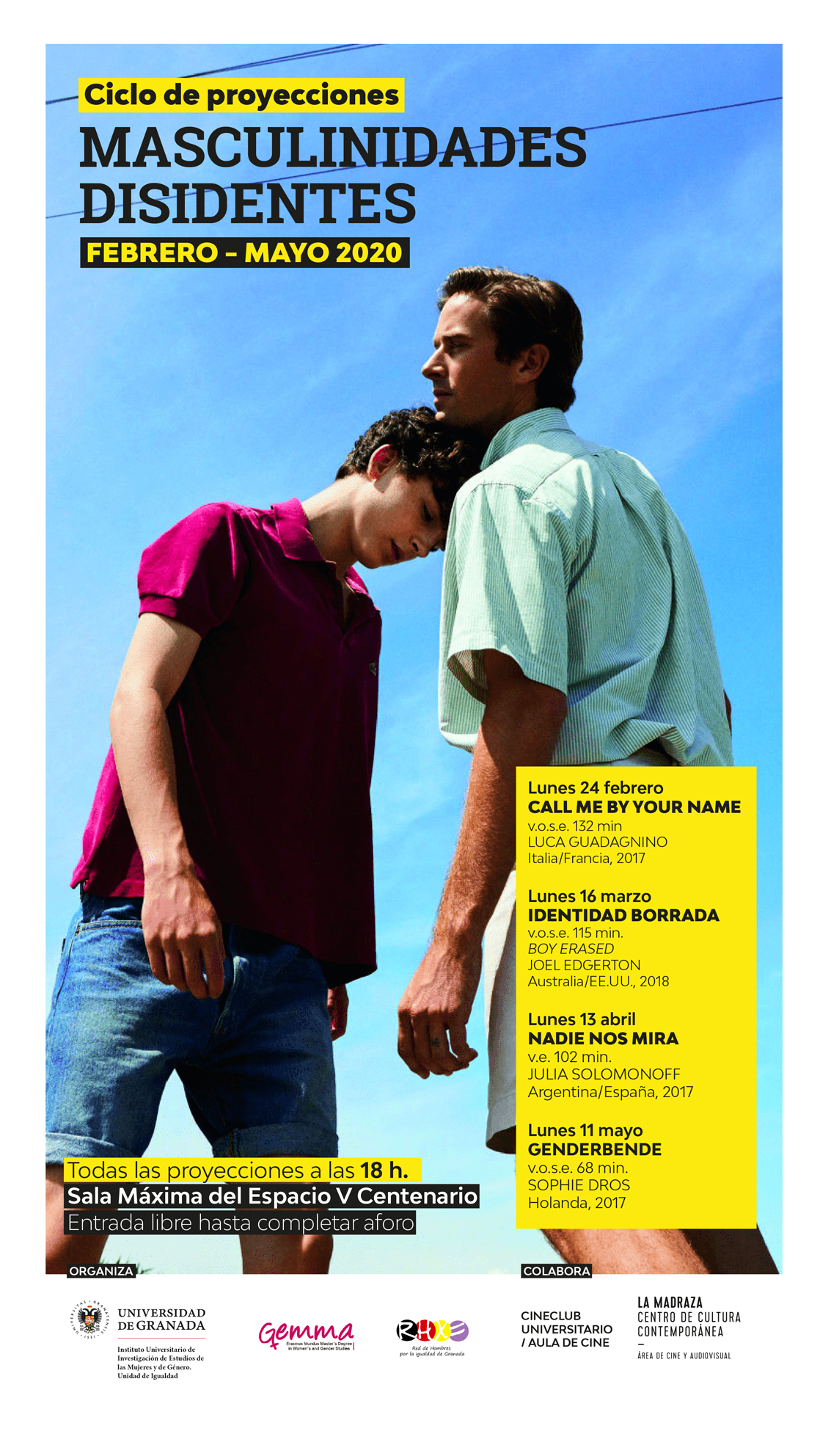September 2019
Official Presentation of GEMMA Master's Degree
The welcome session of the GEMMA Master’s Degree was celebrated on September 16th at the Campoamor classroom of the Scientific Documentation Center. Mobility students from the XII Edition and first year students from the XIII Edition of the GEMMA Master attended this event. The presentation was chaired by the Director of the University Institute for Women and Gender Studies Victoria Robles Sanjuán, the coordinator of the GEMMA Consortium Adelina Sánchez Espinosa and the technical coordinator of the GEMMA Consortium Omayra Herrero Soto.
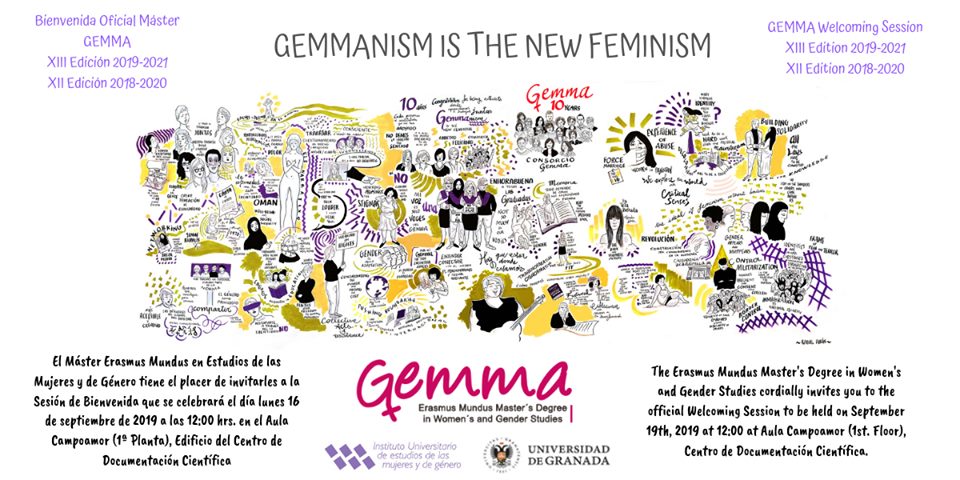
Opening Seminar: "From Gore Capitalism to Snuff Politics: The Body as Mass Media and the Materiality of Virtual Networks"
On the 30th of September, the GEMMA Master’s Degree held its opening conference: ““Del capitalismo gore a la política snuff: El cuerpo como medio de comunicación de masas y la materialidad de las redes virtuales”(From Gore Capitalism to Snuff Politics: The Body as Mass Media and the Materiality of Virtual Networks). This conference was given by the Erasmus Mundus visiting scholar Sayak Valencia, from Colegio de la Frontera Norte - Colef (Mexico), with interventions from Adelina Sánchez Espinosa, the coordinator of the GEMMA Consortium, and Dresda Méndez de la Brena, a PhD student from the Women Studies Doctorate Programme at University of Granada.
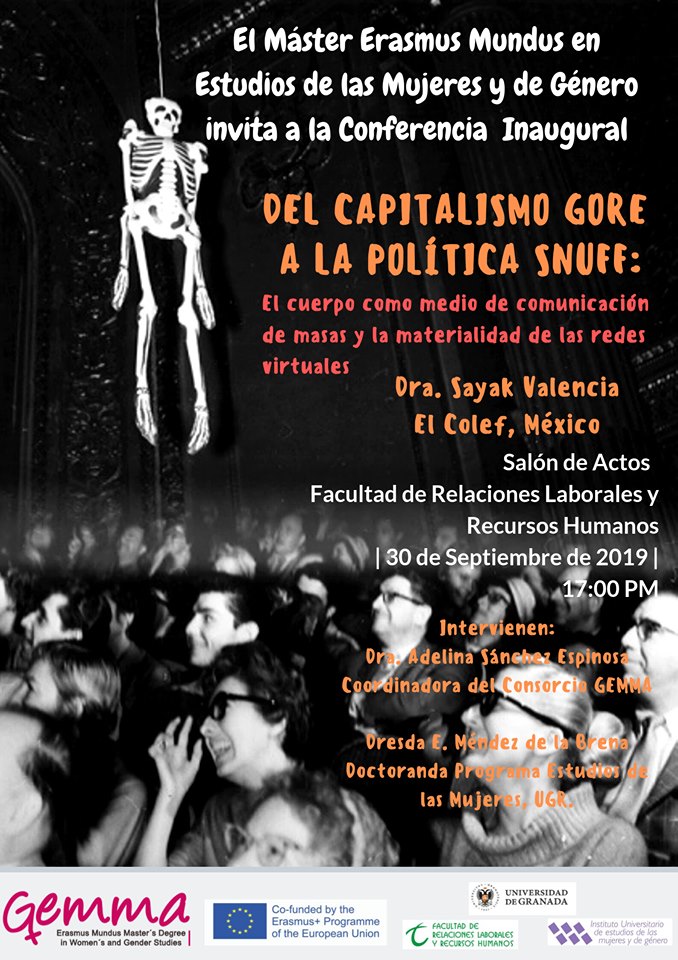
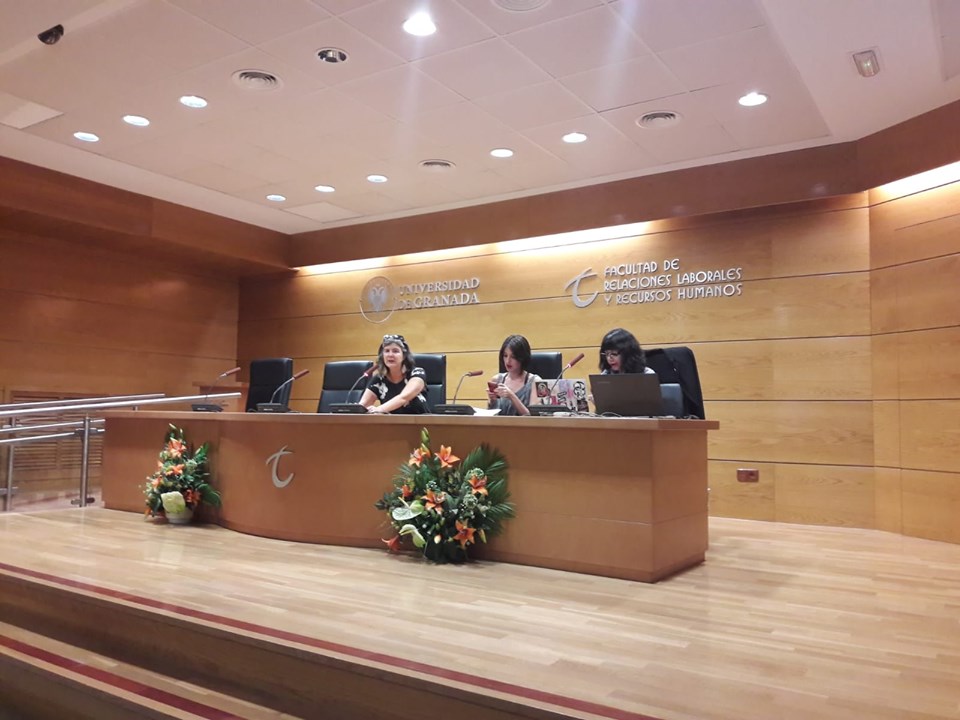
October 2019
Invited Faculty
Professor Sayak Valencia gave lectures on the 1st, 3rd, 8th, 9th and 10th of October as an invited scholar in the courses “Gender, Art and Literature” and “Feminist Research: Case Studies (II)”, both coordinated by Professor Adelina Sánchez Espinosa. She discussed the notion of necropolitics and its relation with death economies, in addition to opposing proposals against necropolitics such as transfeminist movements and post-mortem resistance. Prof. Sayak Valencia participated in the GEMMA Master thanks to the Erasmus Mundus scholarship for visiting scholars.
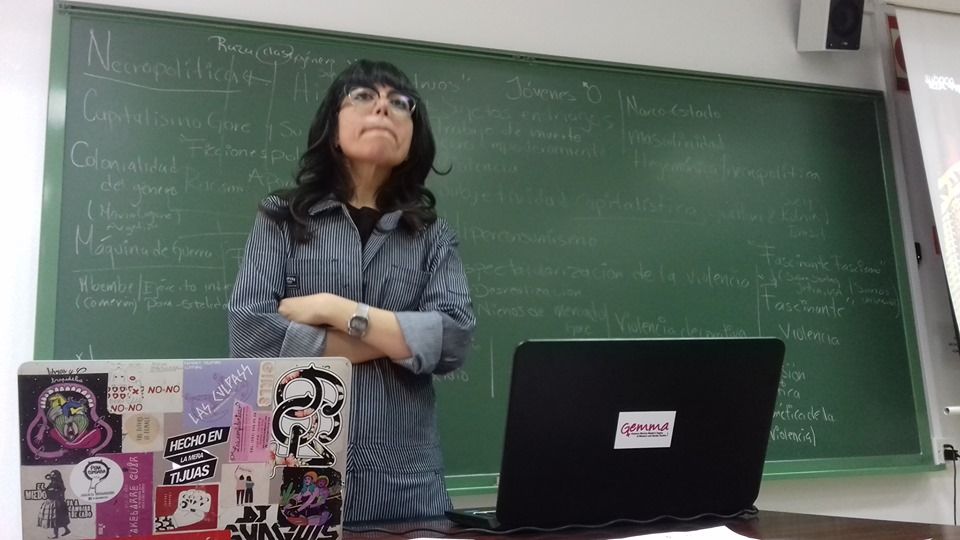
María Jesús López Sánchez-Vizcaíno teaches at the English and German Philology Department at the University of Córdoba. Her main research interests are English-written South African literature, postcolonial literature and British modernism. Her approaches to research are based on the deconstruction as well as the community theories, with the aim of further studying the relationship between literature and ethics. Professor López has published work on authors such as J.M. Coetzee, Virginia Woolf, Samuel Beckett, Margaret Atwood, Zakes Mda and Phaswane Mpe. On October 14th and 15th, she was invited to give lectures in the courses “Gender, Art and Literature” and “Feminist Research: Case Studies (II)”, both coordinated by Professor Adelina Sánchez Espinosa.
Elena Casado Aparicio is a professor at the Universidad Complutense de Madrid, member of the Ordinary Sociology group and coordinator of the “Health and Society” project linked to the course she teaches at the Nursing Faculty. Her research interests are linked to the ethics of care, gender relations, and sociology of communication. Professor Casado visited the Master GEMMA on October 17th and 18th as guest scholar in the course “Metodologías Feministas C: Ciencias sociales y crítica feminista. La metodología etnográfica y el diseño de proyectos de investigación social cualitativos” (“Feminist Methodologies C: Social Sciences and Feminist Critique. Ethnographic Methodology and Design of Qualitative Research Projects”) coordinated by Professor Ana Alcázar Campos. The seminar addressed her proposal of an ordinary, vulnerable, and feminist epistemology as well as the potentialities of technologic and emotional mediations for research work.
Paula Martín Salván, professor of English Philology at the University of Cordoba and member of the research group “Writs of Empire”, visited the Master GEMMA on October 17th and 18th as a guest professor in the courses “Gender, Art and Literature” and “Feminist Research: Case Studies (II)”, both coordinated by Professor Adelina Sánchez Espinosa. Her research focuses on the field of North American literature, modernist and postmodernist novel, critical theory, literary theory, and political and aesthetic thought in the 18th century. Professor Martín has addressed the work of authors such as Don DeLillo, Thomas Pynchon, Cormac McCarthy, J.M. Coetzee, Joseph Conrad, Graham Greene, Robert Cooveras well as Cervantes’ influence on North American novelists and postmodernism.
Frances Negrón-Muntaner, professor at the University of Columbia (United States), gave two lectures at the 23rd and 24th of October in the GEMMA courses Gender, Art and Literature” and “Feminist Research: Case Studies (II)”, coordinated by Professor Adelina Sánchez Espinosa. She examined texts by writers from the Spanish-speaking Caribbean and Latin America, whose work has been in some way marked by exile, emigration and rupture, focusing mainly on how displacement and transculturation have affected the production of new cultural subjects, the articulation of alternative definitions of nationhood, citizenship, and/or sovereignty, and the contradictions of literary reception in metropolitan capitals. Prof. Frances Negrón-Muntaner participated in the GEMMA Master thanks to the Erasmus Mundus scholarship for visiting scholars.
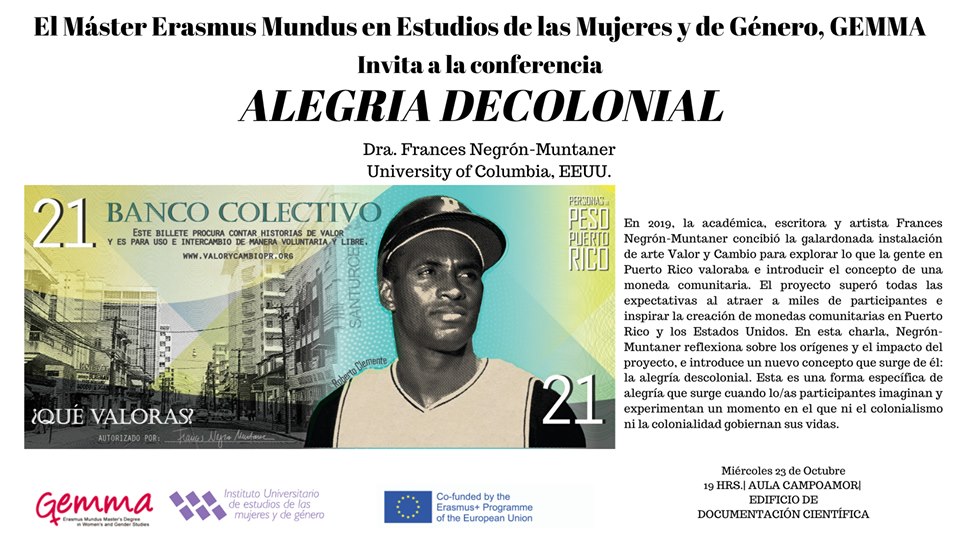
Rocío Medina is professor of the Political Science and Public Law Department at the Autonomus University of Barcelona. Her areas of interest are linked to postcolonial feminist political thought, decolonial studies, and social emancipation theories. Professor Medina visited the GEMMA Master on October 24th and 25th, as an invited professor in the “Women’s Movements” course coordinated by Professor Victoria Robles. During these days, she gave a lecture on diverse issues related to the diversity of feminism’s political subjects, decolonial feminism, and the genealogy of “peripheral” feminisms, including: lesbian, black, third world, Chicana, Islamic, and indigenous feminisms.
November 2019
Invited Faculty
Marta Postigo was an invited lecturer in the course coordinated by Professor Cándida Martínez, “Teorías Feministas: Igualdad, diferencia y diversidad” (“Feminist Theories: Equality, difference and diversity”). Postigo is teacher at the University of Malaga in the area of Moral Philosophy. Her lines of research are related to citizenship studies, applied ethics and social justice, feminist theory, collective identities in a global context, among others. The lecture she gave on November 4th and 5th revolved around the line of continuity and the contributions of Simone de Beauvoir and Judith Butler to the intersection between philosophy and feminism. Furthermore, she addressed the contributions of Betty Friedan and Kate Millet to liberal and radical feminism respectively.
Ioana Gruia is a writer and professor at the General Linguistic and Literary Theory Department at the University of Granada. Her main lines of research are Comparative Literature, Spanish Contemporary Literature, Literature and Gender Studies and Romanian Literature. In addition, she has been awarded various prizes for her literary work. Her production includes books such as: Otoño sin cuerpo (autumn without Body), Nighthawks, Eliot y la escritura del tiempo en la poesía española contemporánea (Eliot and the Writing of Time in Contemporary Spanish Poetry), El sol en la fruta (The Sun in the Fruit) y La vendedora de tiempo (The Time Saleswoman). Professor Gruia was invited to GEMMA on November 5th and 6st, joining Professor Adelina Sánchez Espinosa’s courses “Gender, Art and Literature: The Representation of Women in Literary and Visual Discourse” and “Feminist research: Case Studies II”.
María Jesús Santesmases is a researcher at the Center for Human and Social Sciences of the Spanish National Research Council (CSIC) and was invited to give a lecture on October 11th in the course “Gender, Bodies and Women in History: Health Practices and Scientific Discourses”, coordinated by Professor Teresa Ortiz Gómez.
Carmen Castro García visited the GEMMA Master Program as an invited lecturer in the course coordinated by professor Cándida Martínez, “Teorías Feministas: Igualdad, diferencia y diversidad” (“Feminist Theories: Equality, difference and diversity”). Castro holds a PhD in Economy from the University of Pablo de Olavide (Sevilla) and is a specialized researcher on European Gender Policy. During her visit on November 13th and 14th, she gave two guest lectures relating to the reconceptualization of work and economy from a gender perspective.
Agata Ignaciuk is member of the Institute of Ethnology and Cultural Anthropology of the University of Warsaw and the University Institute for Women and Gender Studies of the University of Granada. Her areas of interest are social and cultural history of medicine, history of reproduction and reproductive rights, history of pharmaceutical marketing, history of women and gender, comparative history, and transnational history. On November 14th, Professor Ignaciuk visited Professor Teresa Ortiz’s course, “Género, Cuerpo y Mujeres en la Historia de Occidente: Prácticas de Salud y Discursos Científicos” (“Gender, Body and Women in Western History: Health Practices and Scientific Discourses”). On this occasion, her lecture revolved around contraceptive practices and policy in Europe and America in the 20th century; and abortion activism and state regulations during the Cold War.
Jennifer Nelson, professor at the University of Redlands (United States), visit the GEMMA Master on the 18th and 20th of November and gave two lectures on the course “Gender, Bodies and Women in Occidental History: Health Practices and Scientific Discourses”, coordinated by Professor Teresa Ortiz Gómez. Prof. Jennifer Nelson participated in the GEMMA Master thanks to the Erasmus Mundus scholarship for visiting scholars.
Visit to Acción en Red
On the 12th of November, GEMMA students visited the headquarters in Granada of Acción en Red, a non-governmental organization whose aim is to contribute to social change, working mainly on the grounds of equality between men and women and the fight against gender violence. The students could have the opportunity to get to know how Acción en Red works and to exchange ideas about how social intervention and education could serve as strategies to foster gender equality in the younger generations. This visit was part of the course “Movements by Women”, coordinated by Professor Victoria Robles Sanjuán.
University Debate about Sex Work
On the 28th of November, the round table 'Academic debates on sexual rights and institutional violence' was organized by the OTRAS research team, feminist perspectives on social research. This day is part of the activities organized by the University Institute of Women of the University of Granada.
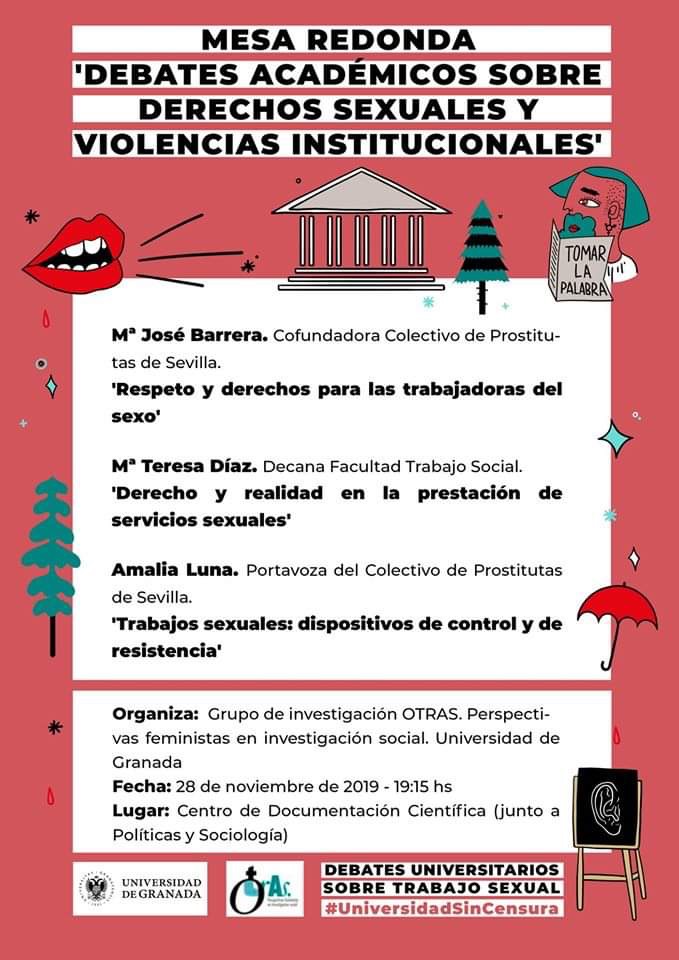
December 2019
Inveted Faculty
Sam Fernández Garrido has a degree in Biology from the Complutense University of Madrid with a Master's Degree in Gender Equality and specializes in Medical Anthropology and International Health. Currently PhD in Queer Studies, medical anthropology and autetnography at the Institute. They was part of the subject Methodologies B, coordinated by Rosa Medina .
Furtivos movie presentation
From the coordination of the GEMMA Master and as part of the research project VAMPIROS EN (LA) TRANSICIÓN, the film # 3 FURTIVOS (José Luis Borau, 1975) was shown as a trans * feminist analysis of the movement against the “ideology of gender » through thirteen films of the Spanish Transition. This activity was on the 13th of December

January 2020
Invited Faculty
María Rosón doctor in Art History from the Universidad Autónoma of Madrid. She has been working at UAM as researcher and professor; is part of the research group ‘Studies of contemporany visual culture’. Her lines of researchs focus on visual and material culture, mainly from the Spanish 20th century, on gender studies and on the construction of history, cultural memory and the visual imaginary.
Dresda Emma Méndez de la Brena has a Degree in International Relations from the University of the Americas, Puebla, Mexico. Master in North American Studies from the same University. Master in Women’s and Gender Studies from the University of Granada and the University of Utrecht in the Netherlands. Feminist, activist and militant has worked in different feminist and women's organizations in Mexico and abroad. She is currently the project coordinator of the Erasmus Mundus Master's Degree in Women's and Gender Studies at the University of Granada, and a PhD student in the Women's Studies program. Practices and gender speeches by the University of Granada. She participated as a guest in the subject of Rosa Medina “Feminist Historiography” on 9th of January.
Meri Torras Degree in Catalan Philology and Spanish Philology from the Autonomous University of Barcelona, where she is also a professor of literature theory and comparative literature. She too is the director of the MOOC “Cultural representations of sexualities”. Her main lines of research are studies in feminisms, cultural, body or cuir theories, as well as autographic studies, theories of (self) representation and the epistolary genre, all from a comparative perspective that dialogues with other terms and disciplines when developing the analysis of literary texts, its main focus of work. She participated in the subject Methodologies B taught by Rosa Medina.
Paloma González Marcén Archaeologist and professor of the Department of Prehistory of the Autonomous University of Barcelona and co-director of the Center for Studies of the Archaeological Heritage of Prehistory attached to the Autonomous University of Barcelona. Her lines of research focus on Public Archeology, recent Mediterranean Prehistory, Women's Archeology and gender relations or dissemination and teaching of Archeology. She participated on 29th, 30th and 31th of January in the subject “Gender and Archeology.”
Zelda Franceschi is an associate professor at the University of Bologna where she teaches History of Anthropology, Anthropology of the Americas and Cultural Anthropology. Since 2004 she has been conducting field research in the Wichí indigenous community of Mision Nueva Pompeya in the Argentine Chaco, where she regularly attends field research. The visit was carried out as part of the “Medicalization and suffering” course coordinated by Professor Nuria Romo Avilés.
Beatriz Revelles Benavente Graduated in English Philology and a former student of the 2nd edition GEMMA Master. PhD in ‘Gender, Politics and Communication in the making: Understanding Toni Morrison’s work in the information Society”. Among other things, she collaborated on a chapter in the monograph on “Toni Morrison and Motherhood”, co-edited by Lee Baxter and Martha Satz. She participated in the subject “Case Studies II: Voices of GEMMA” on 14th of January.
On Wednesday, 15th of January, it was the presentation of the book “Feminist bisexualities against narratives from a situated dissent”, whom the co-author is Agostina Invernizzi, our 2nd year mobility student of this year. The presentation of shared feminist conversations was coordinated by Victoria Robles Sanjuán, director of the University Institute for Studies on Women and Gender
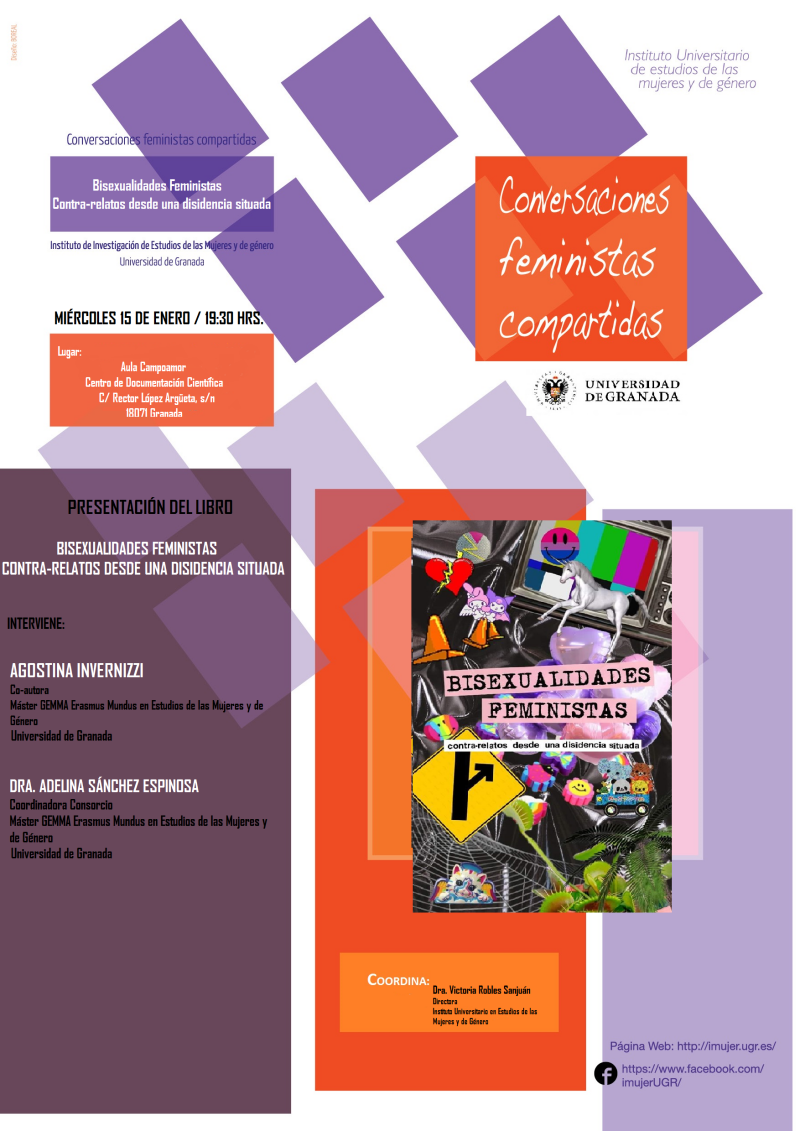
February 2020
Invited Faculty
Marek Wojtaszek is Assistant Professor at the Faculty of International and Political Studies at the University of Lodz in Poland; he is also affiliated with the Department of Transatlantic and Media Studies and Women’s Studies Centre. His main areas of research include American studies, digital and visual culture, philosophy of communication, as well as cultural studies of body and space. Professor Wojtaszek visited the Master GEMMA on 25th and 27th of February, and presented his lectures in the courses coordinated by professor Adelina Sánchez Espinosa: “Feminist Research: Case Studies II”
On 21th of February was the 4th Vampires audiovisual laboratory in (the) Transition organized by Daniel Berjano, former GEMMA student of the 10th edition. The movie “Let's Go, Barbara” by Cecilia Bartolomé (1978) was shown that day.
.jpg)
On Monday, 24th of February, the first session of the projection cycle “Disident Masculinities began with: 'Call me by your name'. Organized by the NETWORK of Men for the Equality of Granada Gemma Erasmus Mundus Institute for Women's and Gender Studies. University of Granada
